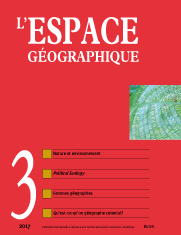

Francophone geography’s contribution to political ecology. Two studies of the relationship between societies and underground water in semi-arid Spain (1 fig.)
This paper is part of the debate within French geography over the idea that it is “a-critical” and struggling to address the political dimension of today's major challenges (social-natural inequalities) when compared to political ecology. Through the study of the relationship between societies and underground water in Spain, we will show that the francophone geography of the 1970s-1980s provided fruitful theoretical propositions, which offer the possibility of engaging in a geography that is as critical, systematic, constructivist, multi-scalar and historic as political ecology.
keywords: DISCOURSE, FRENCH GEOGRAPHY, POLITICAL ECOLOGY, POWER, UNDERGROUND WATER
The political categorization of water under political ecology: The preservation of France’s freshwater ecosystem
Regulating the environment requires descriptive categories to apprehend reality. Political ecology helps analyze both material and discursive consequences of institutional categorization. Using this approach, this article studies French environmental institutions dealing with freshwater ecosystems. Both cases illustrate general mechanisms induced by categorization: equivalences, distinctions, and essentializing. They also illustrate how actors may strategically play with these mechanisms in the political arena to change socio-natural environments.
keywords: CATEGORIZATION, CONSTRUCTIVISM, INSTITUTIONNALISM, POLITICAL ECOLOGY, SOCIO-NATURE
Nature, environment and geography
Women in geography in an era of change. Feminisation and feminism in the French and international academic field (1960-1990) (2 doc.; 2 fig.; 3 tabl.)
Since the turn of the 20th century, women have existed in the French academic field of geography, though in minority numbers. Their presence increased after 1945 and the feminization trend accelerated in the 1960s. Their increased importance, both quantitatively and qualitatively, is measured using various criteria in this article for the period between 1960 and 1990, an era marked by massive scientific and structural changes. Of particular note, in order to gain solid traction in sometimes surprising fields, this phenomenon relied on feminine academic networks, in Paris and throughout France, and was based on a feminism that, despite its marginal position, developed fairly early on and was relatively assertive.
keywords: ACADEMIC GEOGRAPHY, FEMINISM, HISTORY OF GEOGRAPHY, INTERNATIONAL GEOGRAPHICAL UNION, WOMEN, WOMEN GEOGRAPHY
What is a colonial geographer? Jean Brunhes, irrigation and human geography (1894-1911)
Our analysis of the beginning of Jean Brunhes’ career and his thesis on irrigation in arid regions (1902) shows how the imperial context and colonial networks oriented scientific debate and the comparative approach of an author considered one of the founding fathers of human geography. His comparison of different native and colonial systems thus participates in the debate on the proper governance of water and the exercise of sovereignty. The deconstruction of “colonial geography” as a category of the academic practice allows us to nuance further our understanding of the emergence of human geography at the beginning of the 20th century.
keywords: COLONIAL EMPIRE, COMPARATIVISM, GEOGRAPHICAL KNOWLEDGE, IRRIGATION, SOVEREIGNTY
Marie REDON. North Cyprus: In the hope of the reunification (2 photos)
Book reviews
In this issue of l’Espace géographique, you will find critical reviews of the following books
AUGUSTIN J.-P. (2016). Le Sport, une géographie mondialisée. Paris: La Documentation française, coll. «La documentation photographique», 64 p. (André Suchet, université de Bordeaux, Maison des Sciences de l’Homme d’Aquitaine)
L’espace géographique 2/17![]()
![]() L’espace géographique 4/17
L’espace géographique 4/17
For subscribe or buy this issue: BELIN
![]() L’Espace géographique: contents
L’Espace géographique: contents
Last modified: December 11, 2017